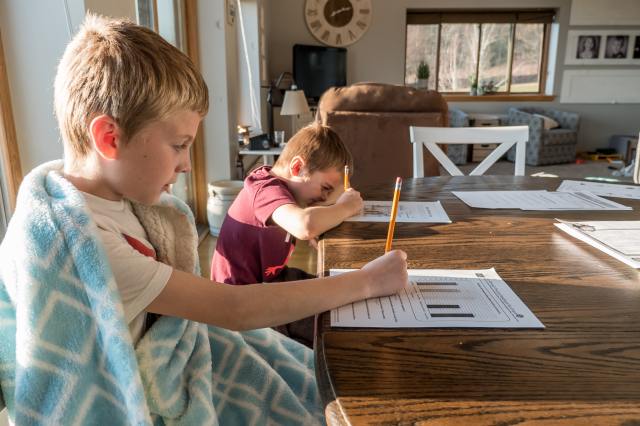Remember the days when your biggest worry was teaching your toddler to walk or to potty train? Those were the days! Nobody prepares parents for how to teach teenagers critical life lessons and emotional intelligence. Yet these are some of the most important skills they need to learn. We’ve talked to experts positive parenting solutions and rounded up 10 things your teen needs you to teach them.

1. How to budget and manage money. Living within your means and managing money is a tough task for adults. The best thing you can do for your teens is to teach them these skills while they're young so they can carry the lessons into adulthood. Teach your teenager how to make a budget, how to save money, how to write a check and how to use credit cards without going into debt.
2. How to do laundry. Eventually, your teen will move out or go to college, and you won't be doing her laundry anymore. Teach them responsibility and how to clean their clothes. If you want to start simple, Amy Carney, author of Parent on Purpose: A Courageous Approach to Raising Children in a Complicated World, suggests starting with doing their wash, but having the teen be responsible for folding and putting away the clothes.
3. Write a thank-you note. In today's world of text messages and Snaps, it's rare for teens to send a hand-written thank you note for a gift received. But just because we're in the digital age doesn't mean etiquette is a lost cause. Instill in your teen the importance of writing a short thank-you note when he receives money, a gift or thoughtful gesture. Suggest a few appropriate sentences and how to properly address an envelope. You may also need to show them where the return address and stamp goes.

4. How to cook a basic meal and boil water. Cooking is a life lesson that teenagers should at least have a basic understanding of. Teach your kiddo how to boil water, how to use a knife, how to saute, etc. Learning these basics will enable your teen to make a simple meal: pasta, scrambled eggs, grilled cheese, tacos and more.
5. Teach the basics of human anatomy, puberty and sexual maturity. Don't assume your teenagers know the basics of their human anatomy or know how to protect themselves sexually. Many parents don't think their teen needs to know about reproduction topics if they're not dating or having sex. Dr. Shelley Metten, a retired professor of anatomy and author of the Anatomy for Kids book series, encourages parents to have those conversations with their kids when they're teens, so they're prepared for the changes happening in their body.
6. How to listen without judgment. Teaching your teen how to listen to friends and adults without judgment starts with you modeling the behavior at home. Instead of panicking or jumping to a conclusion the next time your teenager says something you don't agree with, ask them questions about his statement. Don't argue or discourage an opinion. Instead, listen and be respectful. That behavior will help them do the same as teenagers and into adulthood.
7. Basic manners and decorum. Michelle Bowyer, MSW, and Sagari Gongala, BSc believe that teaching your teen life lessons that revolve around manners and the proper ways to interact with others in social settings will set them up for a smooth social life as they grow. For example, make sure your teen knows the basics like "please," "thank you" and "you're welcome." Also, make sure to teach them how to behave at parties. Does your teen know how to be a polite guest and host? Do your teens know not to start eating before everyone at the table is served? These little life lessons may be ones that are engrained in us as adults, but it was up to someone to teach us those rules as teens.

8. Independence and how to set boundaries. When the Center for Parent & Teen Communication asked teenagers what they wanted from their parents, many responded with guidance on setting boundaries with the independence to do so. Teens admit that the unknown is scary but they don't want to be controlled. Parents should teach teens how to set boundaries and assert independence by guiding them in the right direction, but not leading them down their path.
9. How to contribute to the household. By the time your kids are teenagers, they should be able to make positive contributions to the home. These can include feeding the family pet, walking the dog, putting away the dishes, or sweeping the floors or cleaning the kitchen table after mealtime.
10. What consent means, and how to say "no." One of the most important lessons you can teach your teenager is about consent, and that they have control over their body and can say "no" to unwanted touches or advances. This is critical for both boys and girls to learn as they grow into adulthood. Teens need to know what consent means and exactly what to say to stand up for themselves. This is critical concerning sexual maturity, alcohol, drugs, smoking or bullying. Consent is a critical skill to learn early and often.
— Leah R. Singer
RELATED STORIES:
How to Build Trust with Your Tween (That Will Last Through the Teenage Years)
This Safety Guide Will Help Keep Your Teens Safe Online
Tough Love: Why Teenagers May Benefit From A Strict Upbringing
The (Politically) Correct Questions I Ask My Teenagers























